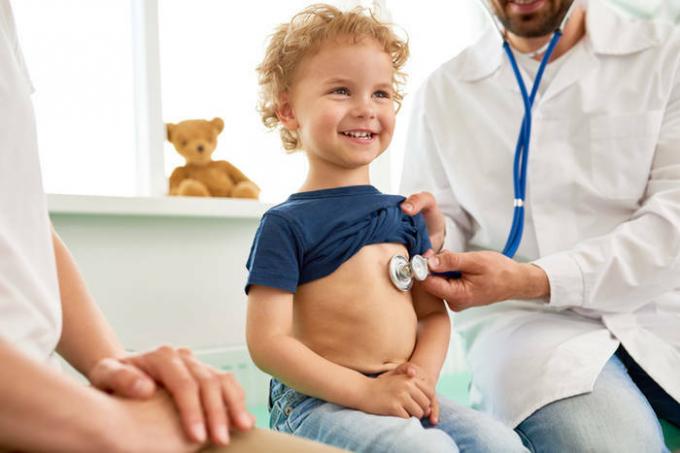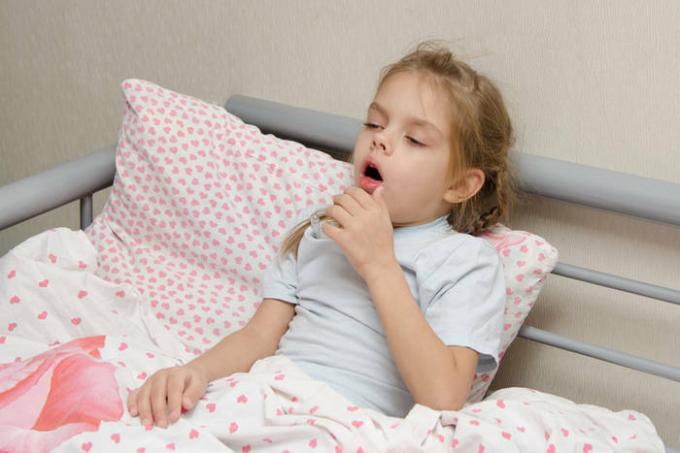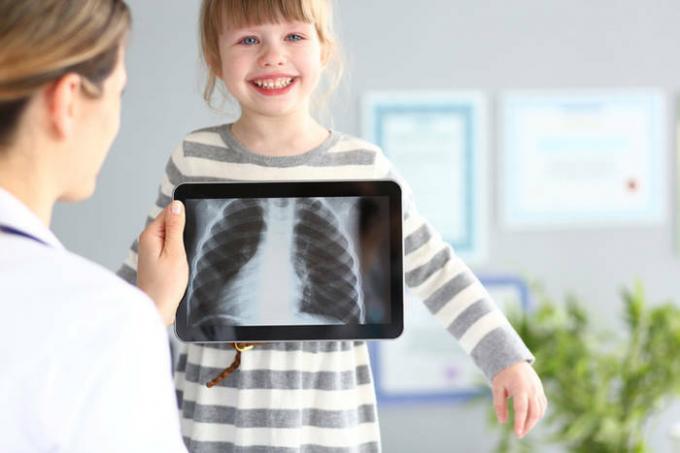The main causes of childhood cough. How to distinguish a "sick" cough from an allergic one. When to use a nebulizer and when is it time to take the child for an X-ray
Childhood cough is a symptom that causes at least concern for parents. In the autumn-winter period, this concern develops into anxiety, and against the background of an increase in the incidence of covid, it may well reach a state of panic. However, “not all coughs are created equal,” and not everyone needs specific treatment. How to distinguish an ordinary viral cough from really serious conditions, is it worth using a nebulizer for ARVI, and when an X-ray is needed for a correct diagnosis, said the famous pediatrician and medical blogger Sergey Butry.
Why does a child cough: rating of reasons

For any cough, it is highly advisable to show the child to the doctor / istockphoto.com
As soon as the child starts to cough, the whole spectrum of childhood illnesses "t less to more" rushes through the mother's head. SARS, bronchitis, laryngitis, false croup, pneumonia and a dozen other conditions that require immediate intensive treatment. In fact, pediatricians say 70% of childhood coughs are due to seasonal viral infections. And Sergey Butriy shares his rating of reasons, compiled on the basis of many years of observation experience:
At the first place among the reasons - all kinds of colds, which are accompanied by a runny nose. It provokes the so-called "posterior nasal drip". Simply put, nasal discharge runs down the back of the larynx, irritating the cough receptors. Also, this group of reasons includes such viral diseases as simple (not complicated by obstruction) bronchitis, tracheitis, laryngitis (with and without croup)
In second place among the causes of cough in children from 1.5 to 7 years old is obstructive bronchitis
On the third place - psychogenic or nervous cough (this is a manifestation nervous tic, which belongs to the group of vocal tic disorders)
Fourth place occupies pneumonia (inflammation of the lungs)
In fifth place among the causes of childhood cough bronchial asthma.
Before you suspect any of the above reasons, be sure to take your child for a consultation with a pediatrician. It is quite difficult to independently "recognize" the cause of a child's cough by sound or intensity. With absolute certainty, a parent can identify only a psychogenic cough. It has very typical features:
- the general condition of the child is not worsened (temperature, runny nose, itching or rashes are not present)
- the cough is short and hacking, more like a cough (usually 1-3 cough jerks at a time)
- the child coughs only when awake; in a dream, cough does not bother him
- during the day, the cough does not appear regularly: sometimes it may not bother the child at all, but it can intensify during stress or frustration
Sometimes parents can independently identify an allergic cough (although it is not on the list of the most common causes, it also occurs in children). The characteristic features of this type of cough: it begins without obvious symptoms of ARVI, has a long course (more than three weeks), accompanied by itching in the nose, sneezing, redness and slight swelling mucous membrane. In addition, a child may develop a rash or conjunctivitis against the background of an allergic cough.
How is a viral cough in a child

Viral cough has its own characteristic course and dynamics / istockphoto.com
The usual viral cough in a child is quite typical. It begins immediately or a couple of days after the onset of other symptoms of the disease (fever, sore throat, nasal congestion, runny nose). The cough builds up rather quickly, while parents can hear changes in his character. The first few days the patient is worried dry hacking cough. Then it becomes "wet" and more intense. For a couple of days, the child coughs up a lot and for a long time, with increased sputum discharge. Then, every day, the cough jerks become less and less, and the child recovers. The whole process takes two (rarely three) weeks.
The doctor's suspicions can be caused by situations when there are no dynamics, and the child "froze" at the stage of dry or wet hacking cough. If this cough lasts longer than a week without improvement, the child needs to undergo additional testing. Sergei Butriy advises in this case to pass a general blood test, an analysis for the content of C-reactive protein in the blood, and also to go for an X-ray of the lungs.
Also, do not discount the so-called "residual" cough. Sometimes it seems to parents that the child has already gone through all the phases of the disease and is moving towards recovery. At the same time, the first, second, third week is going on, and the child still has a cough. Moreover, it can disturb the patient (for example, interfere with his sleep). Sergey Butriy emphasizes: after passing the peak of intensity, the cough can remain for one or a maximum of two weeks. At the same time, there should be a clear trend towards decline. If this is not the case, do not waste your time and go for tests.
When you need to go for an X-ray when you cough

X-rays of their lungs should only be taken as directed by a doctor / istockphoto.com
It is not worthwhile to take the child for an x-ray and take a picture of the lungs "just in case" on his own. Please note that this is not an ascorbic acid, but a very real radiation exposure of a child's body. Sergey Butriy reminds that X-ray is an additional, but not the main diagnostic tool. And there are clear indications for it that any doctor knows.
The first is a suspicion of pneumonia (when the doctor, while listening, notes wheezing in the lungs and severe shortness of breath). The second is pleural effusion (excess fluid accumulation in the pleural space around the lungs). There may also be a suspicion of a foreign body, collapse, emphysema, or destruction of the lung. In some cases, the doctor may order an x-ray to rule out tuberculosis (if the child is worried about an excessively prolonged cough).
Can a nebulizer help cough?

The nebulizer should only be used in certain cases / istockphoto.com
A nebulizer is a medical device that is needed to deliver medicine to the larynx or bronchi. That is, where the notorious "stick with Lugol", cough syrups or ordinary sprays will not reach. A direct indication for using a nebulizer at home is obstructive bronchitis, laryngitis with laryngeal stenosis, and bronchial asthma. Even with ordinary bronchitis, not complicated by obstruction, there is no need for a nebulizer. And with the usual "cold" cough, inhalations do not make sense at all.
However, now every third family has a nebulizer. And if it is, then you need to use it. So many parents at the pediatrician's office directly ask what inhalations a child can take. If you really want to, but there are no direct indications for the use of a nebulizer, Sergei Butriy advises to "breathe" with ordinary saline. There is no evidence of the usefulness of this procedure for a common viral cough today, but there will be no harm to the child from it either.
The main thing that you should definitely not do with a nebulizer is to spray medications through it without a doctor's prescription. Do not pour antiseptics, expectorants, homemade herbal decoctions, and even more oil solutions there. Such inhalation can not help, but only harm the child - for example, cause bronchial obstruction or even provoke pulmonary edema.
You will also be interested to read:
How not to cure a cough: 7 prohibitions from Dr. Komarovsky
5 myths about baby coughs that parents still believe in

